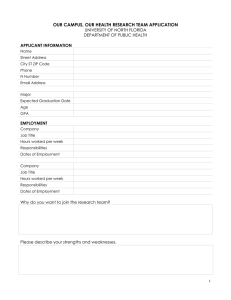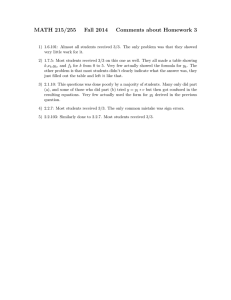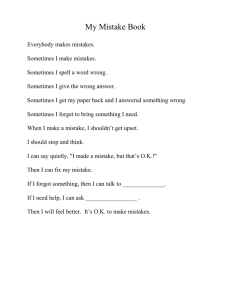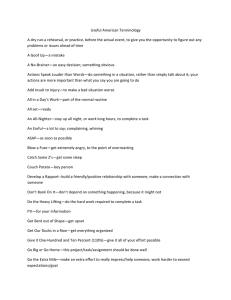CUSTOMS-NOTES
advertisement
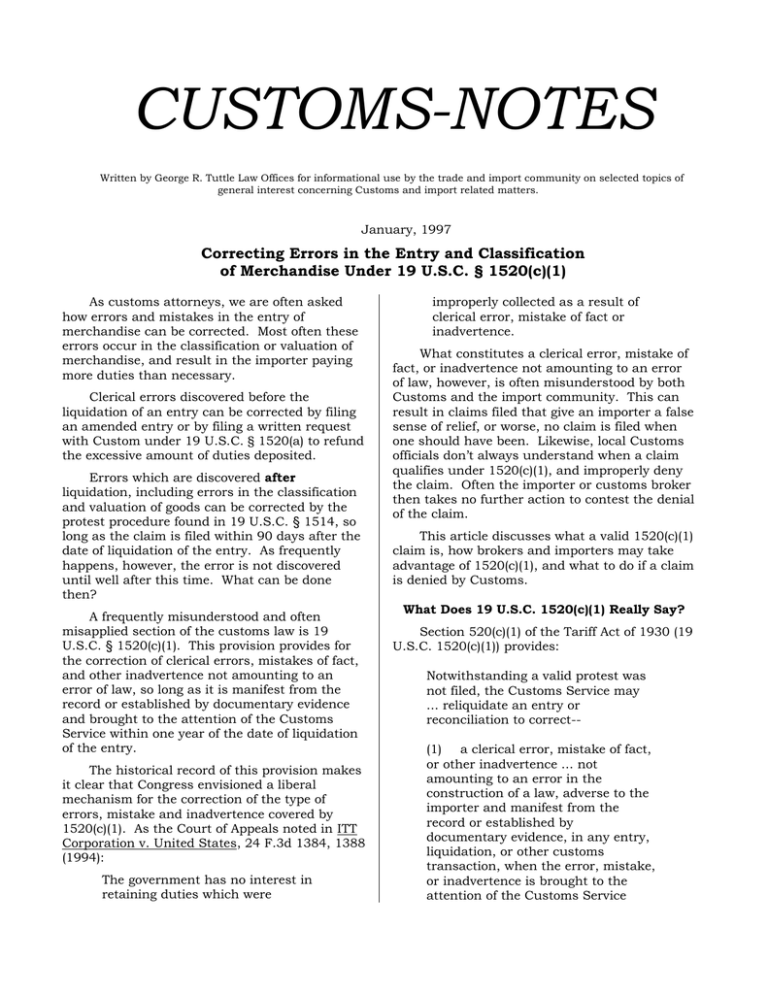
CUSTOMS-NOTES Written by George R. Tuttle Law Offices for informational use by the trade and import community on selected topics of general interest concerning Customs and import related matters. January, 1997 Correcting Errors in the Entry and Classification of Merchandise Under 19 U.S.C. § 1520(c)(1) As customs attorneys, we are often asked how errors and mistakes in the entry of merchandise can be corrected. Most often these errors occur in the classification or valuation of merchandise, and result in the importer paying more duties than necessary. Clerical errors discovered before the liquidation of an entry can be corrected by filing an amended entry or by filing a written request with Custom under 19 U.S.C. § 1520(a) to refund the excessive amount of duties deposited. Errors which are discovered after liquidation, including errors in the classification and valuation of goods can be corrected by the protest procedure found in 19 U.S.C. § 1514, so long as the claim is filed within 90 days after the date of liquidation of the entry. As frequently happens, however, the error is not discovered until well after this time. What can be done then? A frequently misunderstood and often misapplied section of the customs law is 19 U.S.C. § 1520(c)(1). This provision provides for the correction of clerical errors, mistakes of fact, and other inadvertence not amounting to an error of law, so long as it is manifest from the record or established by documentary evidence and brought to the attention of the Customs Service within one year of the date of liquidation of the entry. The historical record of this provision makes it clear that Congress envisioned a liberal mechanism for the correction of the type of errors, mistake and inadvertence covered by 1520(c)(1). As the Court of Appeals noted in ITT Corporation v. United States, 24 F.3d 1384, 1388 (1994): The government has no interest in retaining duties which were improperly collected as a result of clerical error, mistake of fact or inadvertence. What constitutes a clerical error, mistake of fact, or inadvertence not amounting to an error of law, however, is often misunderstood by both Customs and the import community. This can result in claims filed that give an importer a false sense of relief, or worse, no claim is filed when one should have been. Likewise, local Customs officials don’t always understand when a claim qualifies under 1520(c)(1), and improperly deny the claim. Often the importer or customs broker then takes no further action to contest the denial of the claim. This article discusses what a valid 1520(c)(1) claim is, how brokers and importers may take advantage of 1520(c)(1), and what to do if a claim is denied by Customs. What Does 19 U.S.C. 1520(c)(1) Really Say? Section 520(c)(1) of the Tariff Act of 1930 (19 U.S.C. 1520(c)(1)) provides: Notwithstanding a valid protest was not filed, the Customs Service may ... reliquidate an entry or reconciliation to correct-(1) a clerical error, mistake of fact, or other inadvertence ... not amounting to an error in the construction of a law, adverse to the importer and manifest from the record or established by documentary evidence, in any entry, liquidation, or other customs transaction, when the error, mistake, or inadvertence is brought to the attention of the Customs Service Customs-Notes ... within one year of the date of liquidation or extraction. With its legalese and run on sentence structure, it is easy to understand why Section 1520(c)(1) can be misunderstood. There are, however, only four basic elements to Section 1520(c)(1) that need to be remembered. The four elements are: the error or mistake may not be in the construction of a law; it must be adverse to the importer; it must be manifest from the record or established by documentary proof; and, it must be brought to the attention of Customs within one year of the date of liquidation of the entry or extraction. The two elements which seem to be the most troublesome are: (1) what is an error or mistake in the construction of a law, and (2) how must the error be proved (manifest from the record or established by documentary proof)? What Kind Of Error Or Mistake Can Be Corrected Under 1520(c)(1)? Over the years, Customs and the courts have attempted to sort out the kind of mistakes that can be corrected under 1520(c)(1). Frequently, these decisions seem contradictory, however, much of the confusion has been made clear by recent decisions of the United States Court Of Appeals for the Federal Circuit in Aviall of Texas, Inc., v. United States, 70 F.3d 1248 (CAFC, 1995), and Executone Information Systems v. United States, 96 F.3d 1383 (September 24, 1996). While we may refer to other cases or situations involving mistakes and errors, the Circuit Court’s decisions in Aviall and Executone make it clear that any type of mistake, error or inadvertence is correctable under 1520(c)(1) so long as it is not a result of error or inadvertence in the construction of law. The Distinction Between Mistake of Fact And Mistake of Law For many years Customs and the courts have attempted to sort out the legal distinction George R. Tuttle Law Offices between a mistake of fact and a mistake of law, with varied success. It is generally accepted that a clerical error exists when an error is made in the copying or typing of numbers or figures, or when a transposition of numbers has occurred, but not for a mistake in judgment. For example, the transposition of two numbers in the classification of merchandise resulting in the classification of a jacket as water resistant rather than waterproof is a clerical error correctable under 1520(c)(1). However, the same result could also occur in a mistake in judgment when the individual responsible for the classification of the article decides that the jacket is water resistant rather than waterproof. In the case of transposed numbers, relief will be afforded under 1520(c)(1); however, in the case of mistakes in judgment, it may not. Whether a mistake in judgment can be corrected under 1520(c)(1) will depend on whether an underlying mistake of fact or inadvertence led to the faulty decision, or whether the mistake was a result of a misunderstanding as to the legal basis for the decision. It is generally accepted that a mistake of fact occurs when a person believes the facts to be different than they really are and takes some action based on the incorrect information. In Executone Information Systems, the court explained that a mistake of fact occurs in instances when either (1) the facts exist, but are unknown, or (2) the facts do not exist as they are believed. For instance, in our example of the jacket, a person may not be aware that the jacket in question has a waterproof coating applied to the fabric. This would be a mistake of fact because there exists a fact (the coating over the fabric) of which the person is not aware. Likewise, the mistake could be the result of inadvertence. Inadvertence has been variously defined as an oversight, accident, or a result of inattention or carelessness. An example of inadvertence could be the reading of an invoice with a style number different than that that actually imported. If this is the case, and the article with the style number believed to be on the invoice was only water resistant when, in fact, the jacket style number Page 2 Customs-Notes ... that was actually on the invoice is waterproof, then the decision to classify the imported merchandise as water resistant rather than waterproof was the result of inadvertence, and the error is correctable under 1520(c)(1). In ITT Corp. v. United States, 17 CIT 26 (993) rev. on other grounds, the Court of International Trade concluded that an error on the part of a customs broker in classifying merchandise based on the use of company records relating to merchandise that was not the same as that imported was not a mistake of law, but a mistake of fact or inadvertence. More recently, in Aviall of Texas, Inc., v. United States, 70 F.3d 1248 (CAFC, 1995), the Court of Appeals upheld a finding of the CIT that a customs broker’s oversight to timely renew a blanket aircraft certification statement was inadvertence, not negligence, where the broker was unaware of the actual expiration date, but took immediate steps to remedy the mistake once the expired certificate was brought to its attention. A Mistake In Classification Is Not Necessarily A Mistake Of Law A common misconception is that a mistake in the classification of goods is a mistake of law which cannot be remedied under 19 U.S.C. § 1520. In Executone Information Systems, the Court of Appeals noted that a careful reading of cases on this subject clarifies that if the mistake in classification occurred as a result of an underlying mistake of fact with respect to the nature of the goods rather than as a result of an incorrect interpretation of law, then the mistake in classification is correctable under § 1520(c)(1). So What Is A Mistake of Law? In Executone, the Court of Appeals explained that a mistake of law occurs when the facts are known, but their legal consequences are not. In other words, § 1520(c)(1) may not be used to rectify incorrect interpretations of the law by an importer, customs broker, or Customs. In Computime Inc. v. United States, 9 CIT 553 (1985), an importer argued that LCD watch modules were classifiable as other electrical articles and not watches or watch parts. Customs knew the articles were LCD watch modules but refused to classify them as other electrical articles despite a decision by the court in Texas Instruments v. United States, 1 CIT 236, holding otherwise. The court found that Customs’ decision was not based on a mistake of fact as to the article but a conscious decision on the part of Customs to not classify the goods as other electrical articles. Lack of knowledge of a more favorable tariff provision is also not a mistake of fact, but one of law. Concentric Pumps, Ltd. v. United States, 10 CIT 508. In Universal Cooperatives Inc., v. United States, 13 CIT 516 (1989), the court explained that there are decisional mistakes and ignorant mistakes. A decisional mistake was explained as a mistake in which a party makes the wrong decision between two known alternative set of facts and an ignorant mistake occurs when a party is unaware of the existence of the correct alternative set of facts. Thus, a lack of knowledge of the existence of facts which would support an article’s eligibility for more favorable tariff provision is a mistake of fact. See, C.J. Tower & Sons v. United States, 68 Cust. Ct. 17, C.D. 4327, aff’d 499 F.2d 1277 (CCPA, 1974). In our example of the jacket, if the importer knew that the jacket was coated, but was unaware of the fact that coated jackets might be treated differently that non-coated jackets with respect to tariff classification, or simply misunderstood the definition of waterproof as applied to treated fabrics, then a mistake of law has occurred and no relief is available under 19 U.S.C. § 1520(c)(1). George R. Tuttle Law Offices Page 3 Customs-Notes ... How Must The Mistake of Fact Or Inadvertence Be Proved Unless the error is plainly evident from the papers submitted at the time of entry, it will be the responsibility of the importer to demonstrate by affidavit or testimony, or by presentation of other credible proof of the underlying facts that a mistake of fact or inadvertence occurred. Failure to do so will result in the finding that the error can not be remedied under 19 U.S.C. § 1520(c)(1). In Executone Information Systems, the Court of Appeals found that classification of Executone’s merchandise at an 8.5% duty rate was the result of a mistake of fact because Executone thought that the CBI Form As had been filed, when, in fact, they had not. As the court said, this is precisely the type of error which is correctable by § 1520(c)(1). Why, therefore, was Executone’s § 1520(c)(1) claim ultimately denied by the Court of Appeals? Because, as noted by the court, an importer must provide evidence of the underlying facts that a mistake of fact or inadvertence occurred. In Executone’s case, it did not adequately explain why its customs broker did not submit form As in a timely fashion. As such, the court concluded that Executone did not provide adequate proof as to the existence of a mistake of fact or inadvertence, rather than intentional or negligent inaction. This result can be compared to that in Aviall of Texas, Inc., v. United States, 70 F.3d 1248 (CAFC, 1995), wherein the § 1520(c)(1) claim was granted, even though the broker admitted that it forgot to renew the certification, because it did so in an expedient manner once the error was brought to its attention. What To Do After Discovery Of A Mistake Or Error In The Entry of Merchandise? Immediately after the discovery of an error or mistake in the entry, classification, or valuation of merchandise, the importer or broker should take action to advise each other of the problem. George R. Tuttle Law Offices Next, a determination should be made as to whether there is still sufficient time to file a protest under 19 U.S.C. § 1514. If not, consideration should be given as to whether a § 1520(c)(1) claim can be made. Whether or not a valid § 1520(c)(1) claim can be made will depend on many factors not the least of which is whether the error was the result of a lack of knowledge of the underlying facts, or as a result of a lack of knowledge of law or an incorrect legal interpretation. Next, assuming one can establish that a mistake of fact or inadvertence occurred, one will still need adequate proof as to the existence of the mistake or inadvertence. This may be demonstrated by documentary proof, affidavit, or testimony of the parties involved. What To Do If Your Claim Is Denied Importers should not be dissuaded from pursuing the matter even if the 1520(c)(1) claim is initially denied. The vast majority of 1520(c)(1) claims are denied by Customs, particularly if the claim relates to the classification, special duty rate or tariff preference treatment. The protest procedure found under 19 U.S.C. § 1514 provides for situations involving the denial of a 1520(c)(1) claim. Under appropriate circumstances, the denial of the 1520(c)(1) will be reversed at the Customs Headquarters level if Further Review is requested, and if not, proper follow through of the administrative procedures is a prerequisite to judicial review. Is judicial review worth it? It may be. Just ask Aviall of Texas, Inc. For additional information on this subject or for additional copies of this publication contact: George R. Tuttle Law Offices Three Embarcadero Center, Suite 1160 San Francisco, CA 94111 Phone (415)986-8780 Fax (415) 986-0908 E-mail address: info@tuttlelaw.com Page 4

